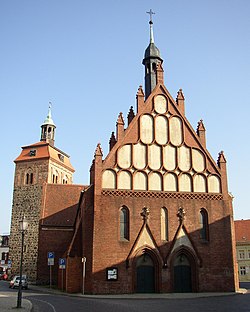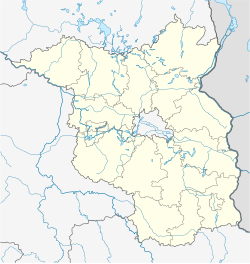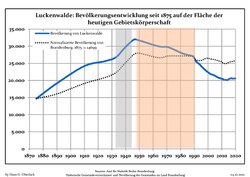|
Luckenwalde
Luckenwalde (German: [ˌlʊkn̩ˈvaldə] ; Upper and Lower Sorbian: Łukowc, Upper Sorbian: [ˈwukɔfts], Lower Sorbian: [ˈwukɔwts]) is the capital of the Teltow-Fläming district in the German state of Brandenburg. It is situated on the Nuthe river north of the Fläming Heath, at the eastern rim of the Nuthe-Nieplitz Nature Park, about 50 km (31 mi) south of Berlin. The town area includes the villages of Frankenfelde and Kolzenburg. Overview The former Slavic settlement of Lugkin was conquered by Margrave Conrad Wettin of Meissen in the course of the 1147 Wendish Crusade. Lukenwalde Castle was first mentioned in a 1216 deed as a burgward of the Bishopric of Brandenburg, it was acquired by Zinna Abbey in 1285. Together with Zinna it remained under the rule of the Archbishopric of Magdeburg and its successor, the Prussian Duchy of Magdeburg until it was attached to the Margraviate of Brandenburg in 1773. Originating in the 17th century, Luckenwalde's cloth and wool factories did not spring up till the reign of King Frederick II of Prussia and soon were among the most extensive in Germany. Other traditional industries were cotton printing and a dye works, brewing, and the making of metal and bronze goods. In 1808 Luckenwalde officially received town privileges. By the turn of the 20th Century Luckenwalde became renowned as a key manufacturer of hats. In 1921 the two biggest hat ateliers, Herrmann and Steinberg, merged and set up their factory on an industrial estate in Luckenwalde. The factory was designed by German architect Erich Mendelsohn in 1923, the factory is considered a milestone of Expressionist architecture. The hat factory fell into disrepair during and after the war period and was restored in 2001, but as of 2013 the building remains empty.[3] During World War II, there was a Stalag for prisoners of war (Stalag III-A). There was also a work camp for civilians. The Nazis forced people to work for their war effort or else the families of people who worked there would perish. Lack of food and hard work killed thousands. Among them were Poles, Italians, French and many more. There were several places in the town and surrounding areas where they worked. Luckenwalde was taken by the Red Army on 22 April 1945.[citation needed] Demography
PoliticsSeats in the municipal assembly (Stadtverordnetenversammlung) as of 2014 elections:[5]
TransportLuckenwalde station is located on the Berlin–Halle railway. Notable people
International relationsLuckenwalde is twinned with:
References
This article incorporates text from a publication now in the public domain: Chisholm, Hugh, ed. (1911). "Luckenwalde". Encyclopædia Britannica. Vol. 17 (11th ed.). Cambridge University Press. p. 106. External links
Notgeld (emergency banknotes) depicting the industries Luckenwalde was known for in the early 20th century. http://webgerman.com/Notgeld/Directory/L/Luckenwalde.htm |
|||||||||||||||||||||||||||||||||||||||||||||||||||||||||||||||||||||||||||||||||||||||||||||||||||||||||||||||||||||||||||||







